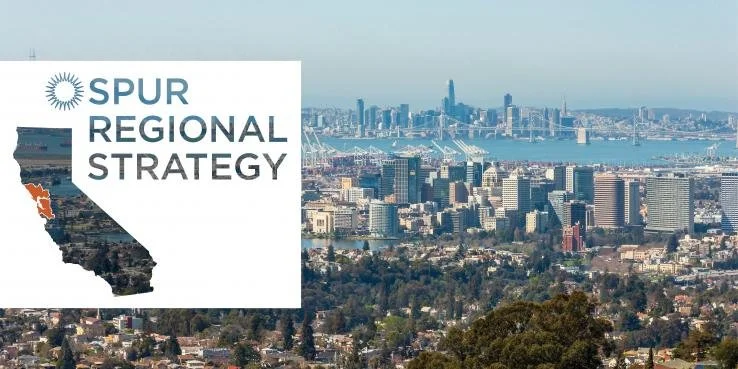This is the amount needed to help limit planetary warming to an average of 1.5ºC, the largest temperature rise that the Intergovernmental Panel on Climate Change has deemed manageable. Aside from the obvious ethical issues they raise, wealth inequality and climate change threaten the long-run prosperity of all stakeholders.
While these problems have complex causes, they have some relatively simple solutions. In our urban centers, one of the simplest ways to mitigate wealth inequality and climate change is through housing policy. Specifically, urban infill aimed at housing densification brings down living costs, minimizes our collective carbon footprint, and increases job opportunities for low and middle income individuals.
SPUR’s Role in Advancing Densification
The San Francisco Bay Area Planning and Urban Research Association (SPUR) is generally credited with creating the BART system, which has dramatically improved life in the Bay Area. Although it is a remarkable accomplishment, an efficient and comprehensive public transportation system shared between neighboring municipalities can only go so far in improving quality of life in the Bay Area.
With a clear understanding of the merits of densification, SPUR has also been at the forefront of changes to housing policy in the Bay Area and statewide as well. Among its many noteworthy accomplishments on housing, SPUR co-sponsored major pieces of state legislation that were signed into law last year: SB 8, SB 9, SB 10 and AB 1174. These bills respectively expedite multifamily housing approvals, end “single family only” zoning, create opportunities for small neighborhood multifamily developments, and streamline the litigation process if deed-restricted affordable housing projects stall from zoning-related lawsuits.
Housing and Inequality
SPUR is a uniquely effective public policy think tank, as its work is marked by academically rigorous research and nonpartisan collaboration. In the case of housing, the evidence and the necessary policy changes could not have been clearer to SPUR’s board of directors. When areas with greater economic opportunity lack dense, affordable housing, this exacerbates wealth inequality and climate change in various ways.
With respect to wealth inequality, it limits the supply of housing in high income areas for people who are most in need of higher income. This normally has one of two effects. Either it pushes those people out of areas with greater opportunity, making their commutes burdensome if they continue to seek higher paying work in these areas; or if they cannot leave, it normally forces them to live in undesirable conditions, making their lives at home burdensome as they overcrowd houses and apartments that were not designed to accommodate large numbers of people. These burdens tend to decrease an individual’s productivity at work, which limits the potential for career advancement.
They also threaten the long-run prosperity of all Bay Area stakeholders. Companies don’t normally want to grow in places where their workers cannot afford to live. So capital flight is a big risk if housing providers are obstructed from meeting the demand for more affordable housing.
Housing and Climate
With respect to climate change, there are three main problems that stem from a lack of dense, affordable housing. They relate to location, size and transportation. The problem of location is that the demand for more housing will be met elsewhere, if not in our urban centers. Those other places tend to be open spaces on the periphery of our cities. Since open spaces are responsible for an abundance of carbon sequestration, their leveling for development eliminates the buffering they can offer against climate change.
The problem of size is that the alternative to dense, affordable housing is housing with more square footage per capita. This type of housing typically requires more building materials and more energy to maintain and operate. This translates to more fossil fuel emissions every step of the way.
The problem of transportation is that people who are pushed to the periphery must commute to urban centers if they continue to work in these areas of greater opportunity. This again increases fossil fuel emissions. Car production is carbon-intensive, and cars themselves depend on fossil fuels directly or indirectly through, e.g., burning of natural gas for electricity production or mining of rare earths for batteries. Even if we increase public transportation from the periphery, this still requires an increase in fossil fuel emissions. For every 1 ton of steel produced, 1.85 tons of CO2 get sent into the atmosphere, and public buses (mostly made of steel) weigh anywhere from 15 to 20 tons. Moreover, our public buses typically run on diesel or natural gas, and the electricity for our trains is mostly generated from non-renewable sources of energy.
Riaz Capital’s Involvement
With the help of housing industry leaders, SPUR has gained support from many local officials for its housing proposals. Riaz Taplin, the founder and CEO of Riaz Capital, is one such leader who has used his board seat at SPUR to advocate tirelessly for densification. As SPUR's Chief of Policy Nick Josefowitz remarks, "Riaz recognizes the importance of our work on densification. He uses his board seat to advocate for sustainable development on behalf of the 'missing middle', and he uses his company to build them housing in a sustainable way. We're lucky to have such civically minded developers on the board."
Taplin’s knowledge of the Bay Area’s evolving workforce has been integral to his work at SPUR and to his company’s focus on middle income workforce housing. In contrast to decades past, the Bay Area’s middle income demographic now consists largely of individuals who are young (between the ages of 25 and 45), single, career oriented, and experience seeking. What this all means for housing is clear: multi-bedroom domiciles, development on the periphery and luxury apartments are suboptimal. This is largely why Talplin has called for increased densification of affordable housing, while his company has focused on high-quality, low-cost studio apartments in areas of greater economic opportunity.
As Taplin notes, “The middle income workforce is vital to the Bay Area’s overall prosperity. Yet their housing needs have clearly been overlooked. If we want the Bay Area to thrive, we need to look out for the middle income demographic. First and foremost, that means addressing their housing needs.”
Wealth inequality and climate change may seem like different problems at first glance. But they are ultimately two manifestations of the same issue: a failure to prioritize the common good over short run self-interest. Although they present daunting challenges, they are not insurmountable, as long as we are willing to think and act holistically. Housing densification is a crucial part of that holistic solution. With the right guidance from public policy institutes like SPUR and the right leadership at the state and local level, the Bay Area can remain a center of prosperity while achieving equity and sustainability.


